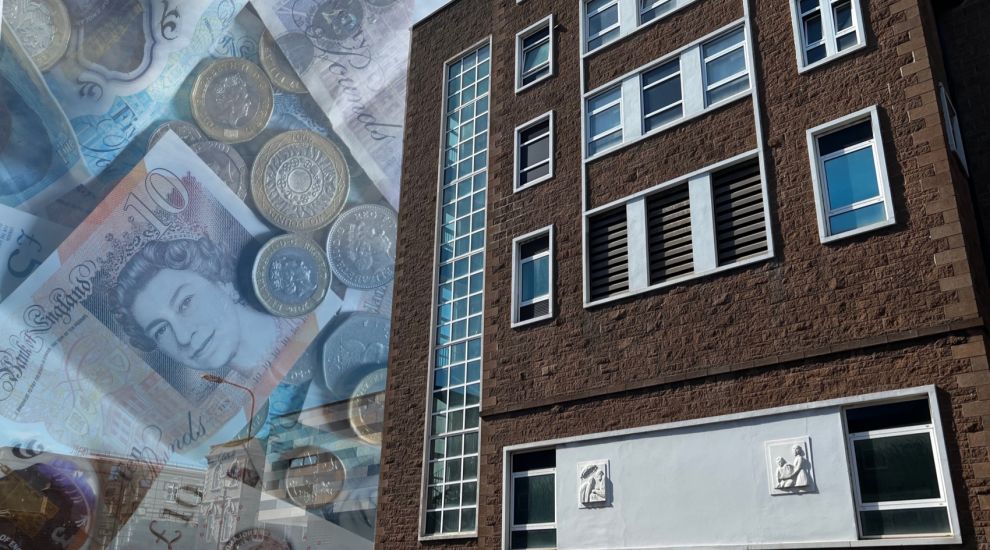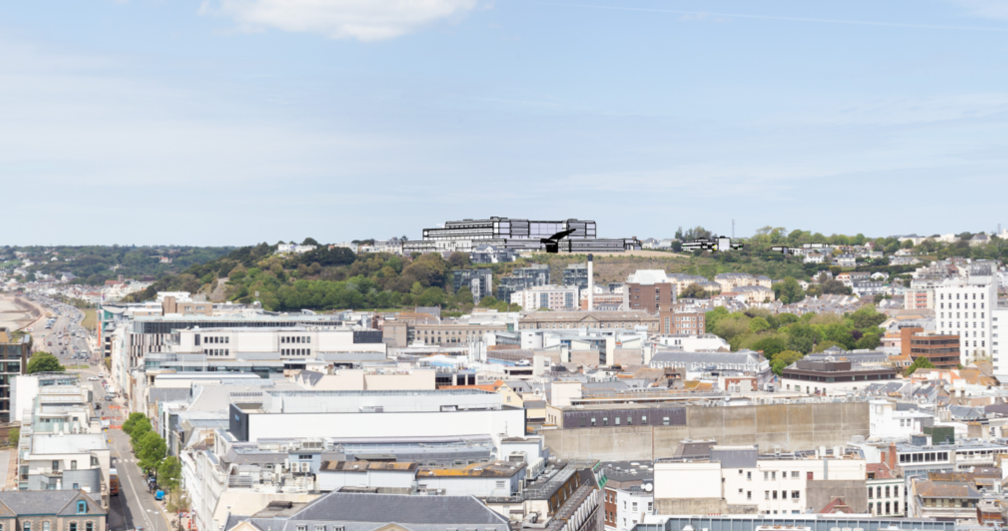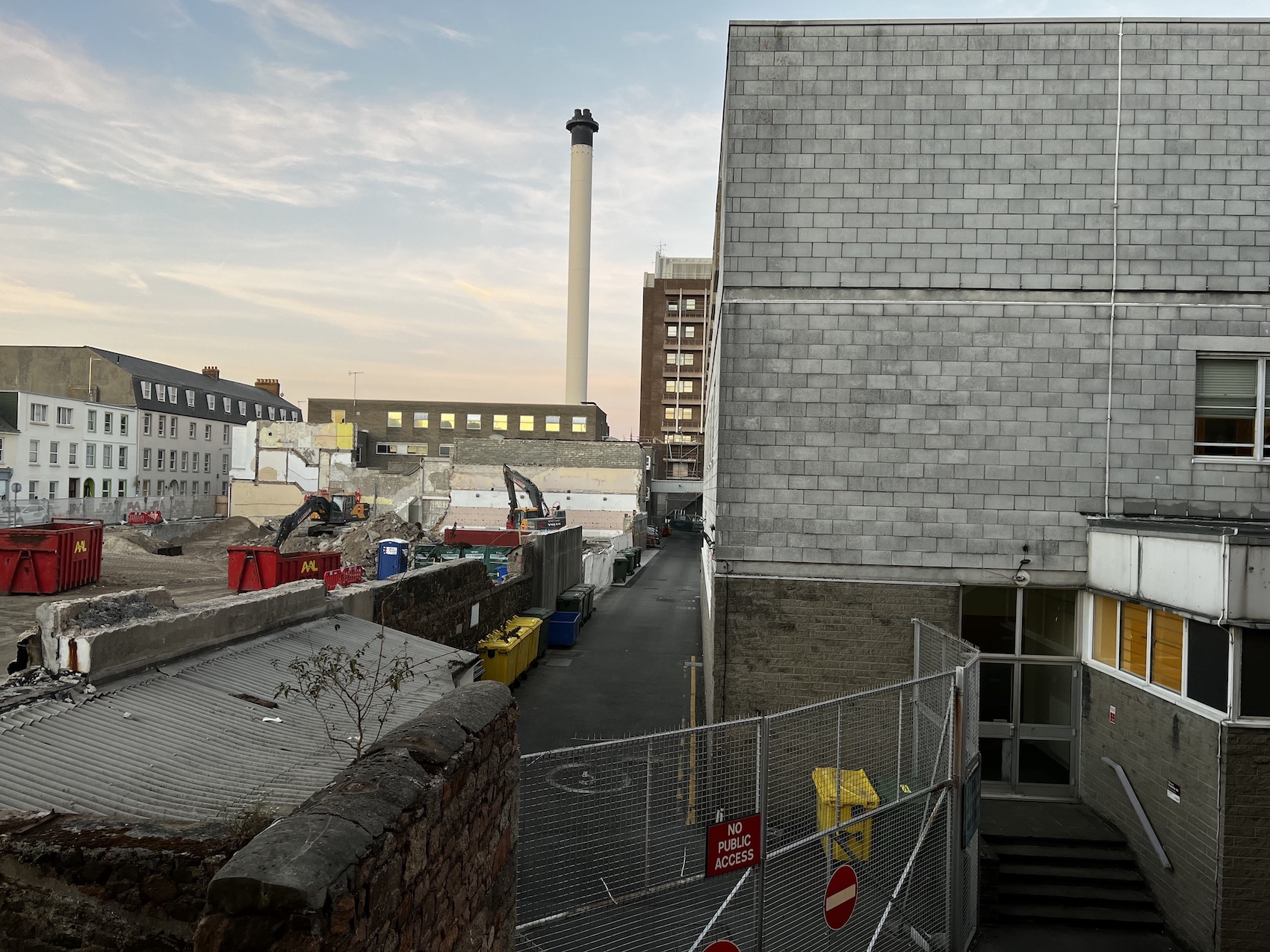


A £30,000 Government review has concluded that the current 'Our Hospital' plan for Overdale should be scrapped in favour of a new multi-site solution - but the exact cost of the favoured project remains unclear.
Led by Infrastructure Minister Tom Binet and released this morning, the report concluded that a “phased option delivered over two or more sites" - primarily at Overdale and Gloucester Street/Kensington Place, where work on homes was halted in anticipation over summer - would provide the "best opportunity to make the scheme more affordable and appropriate”.
This option would also mean maintaining the current 'satellite' health premises being set up at the former Les Quennevais School site.
Mental health services may also continue to be delivered at a separate location - but this will be subject to a review starting immediately, according to the Minister.
Estimates from external consultants contained in the £30,000 review report list construction and client costs for a dual-site solution as being between £646m and £775m. This does not include contingency funding or other costs, such as compensating the developers working on the aborted Andium Homes project at Kensington Place.
While Deputy Binet said he was unable to confirm the overall cost of the preferred hospital solution, he did state that it would entail an estimated £126m saving on the existing Overdale plan.

Pictured: Deputy Binet said he expected the new proposal would save more than £100m.
The review estimated that the total construction and client cost of the current 'Our Hospital' project has already risen by £115m since States Members approved it, taking the current scheme from £664m in construction and client costs to £772m.
Once other costs, such as contingency measures, are folded in, this would take the project over £1bn.
The preferred option to develop more than one site will take up to 36 months to complete, be smaller than the 'Our Hospital' scheme for Overdale, will require an amended planning application.
The review argues that the dual-site scheme will provide various savings, including up to £60m by having a competitive bidding process to build the various phases.
It also predicted a saving of £50m by not needing extra land and property, nor having to realign and enlarge Westmount Road.
It also acknowledges that the Government will have a job to do to convince those clinicians who argued for a single-site hospital.

Pictured: Ministers halted Andium's work to build homes at Kensington Place in case the land was needed for future hospital expansion earlier this summer, in advance of the review's publication today.
It concludes: “Being mindful of past delays and the age and deteriorating condition of the existing hospital facility, the review recognised that the hybrid phased option, if accepted, should be progressed at pace and within clearly defined timescales in order to retain public confidence.
“It is acknowledged that the project will have to work hard to ensure clinicians also understand and can accept the reasons that previous proposals are no longer affordable and that this phased approach is the solution that is most achievable.
“The project team needs to ensure that all work undertaken to date is exploited to minimise any rework by clinicians.
“Ministers have provided clear direction to the Review that construction of new facilities must commence within the current electoral term.”
It adds: “In addition to being more affordable, to be appropriate, the right services must be delivered in the right place.
“Consequently, the review recommends that further, comprehensive consultation should take place with all stakeholders, but especially healthcare staff and clinicians before determining the locations of the different services.
“Some adjacency of service are absolutely essential and these will provide a ‘critical mass’ of departments that should stay together.”
Exactly what goes where under a dual-site solution is yet to be decided, and this will have to be reviewed alongside relevant stakeholders.
At present, the first phase of building is suggested to include elective in-patient and day surgery, outpatients and intermediate care services, including rehabilitation.
The second phase is proposed as including emergency and in-patient services, intensive care and a 'Knowledge Centre' for training and professional development.
The review also found that mental health services could be established at a separate standalone location, which could be on the Overdale site, although further work would need to be undertaken to validate this possibility.
The review was officially released this morning, coinciding with Deputy Binet making a statement to States Members.
He explained that external factors such as covid-19, the Ukraine war and Brexit, had all impacted the costs of the current project, which the review had concluded was no longer affordable.
A recent request under the Freedom of Information Law confirmed that £77m had been spent on the 'Our Hospital' project for Overdale to date.
It also showed that the project team working on delivering a new hospital for Jersey were continuing with approximately £55,000 per month.
Express will be releasing a special edition email tonight explaining the findings of the review in-depth, and what happens next... Sign up to our free daily news email here to make sure you don't miss it.
"As you might imagine, presenting a review of the most recent hospital project, creates something of an anxious moment for me, given its complex and long running background. Nonetheless, it's a review that was very much required, particularly in light of recent global events, that are already having a major effect on us, here in Jersey.
"Over the past nine months we've witnessed a number of things that would have been unthinkable this time last year; war in Eastern Europe, a fuel and energy crisis, inflation at 10%, and the strong likelihood of recession.
"Severely disrupted supply chains are giving rise to long lead times for most materials, with corresponding increases in cost. And labour is in short supply, as a result of covid-19 and Brexit.
"Against this backdrop, international contractors are extremely wary about under-pricing and taking on greater risk. As a consequence, fixed price agreements are likely to become a thing of the past, as they look to safeguard themselves in this new environment.
"This, I'm afraid, is the new reality for us.
When the funding model for the 'Our Hospital' project was first revealed, Jersey was hoping for an average return of 4.6%, over a 40-year period, on its billion-pound strategic reserve fund. That's 2% above the Fiscal Policy Panel's long-term RPI assumption. And borrowing costs were anticipated to be fixed at 2.5% for the duration.
"While a period of 40 years is difficult to predict, it's fairly certain that we won't see a return to those halcyon days any time soon. The strategic reserve won't reach its target this year (by some margin, I'm told) and the cost of borrowing is considerably higher. This change in circumstances, therefore, plays a big part in the review. And, perhaps unavoidably, frames some of the fundamental thinking, particularly the need for a more robust approach to risk management.
"However, grim as it may be, the situation is not without some opportunity. For example, the amount of information and knowledge accumulated, and paid for, during the Our Hospital process, has enabled most of the review work to be undertaken by our existing, and experienced, local team.
"The only external assistance has come from the review's Principal Expert Advisor, Mr Alan Moore.
"By way of background, until his retirement in September last year, Mr Moore was the Director of Strategic Capital Development within Northern Irelands 'Western Health & Social Care Trust'. And in this capacity was the SRO (that's to say, Senior Responsible Owner), for the successful delivery of a £1 billion capital investment programme.
"That responsibility included the delivery of the South-West Hospital at Enniskillen, the new Hospital and Primary Care Complex at Omagh, the North-West Cancer Centre, and the phased re-development of the Altnagelvin Area Hospital in Londonderry.
"While Mr Moore's involvement was being arranged, an appropriate 'Terms of Reference' was drawn up and given the pressing need to progress matters, a decision was taken not to reopen the site selection process. Instead, a number of more practically deliverable options were selected and a comprehensive consultation process began, which included some 20 stakeholder meetings involving over 60 individuals.
"Accepting that the current hospital may be required to stay in service for slightly longer than anticipated, the hospital's maintenance team were consulted at an early stage and assurances were given that all required resources would be made available to keep the existing hospital buildings safe, without the need for unnecessary bureaucratic processes.
"With regard to the review, it's important to state that the focus has, first and foremost, been to ensure that the conclusion would lead to the best possible facilities for both patients and health- care staff, in all areas.
"In the process, every effort has also been made to combine this focus with an emphasis on some form of 'project phasing' (possibly by way of a 'dual site' or 'hybrid' model) to spread the financial risk over a longer period, deliver better value for money to the taxpayer, whilst recognising the urgent need to progress as quickly as possible.
"In addition, devising a scheme where buildings could be designed to a scale more compatible with their surroundings, requiring less impact on the existing environment, and offering better project access to local construction firms and associated building trades. Finally, to allow for future, cost effective expansion, using modern methods of construction.
"As Members will now know, the recommended option is to develop facilities on two major sites: Overdale and Gloucester Street; this to be carried out in two distinct phases, to allow for a higher degree of risk management. In addition, to retain the use of the facilities currently being developed at Les Quennevais, in order to prevent unnecessary waste and reduce the area, and costs, required to replicate them on either of the two main sites.
"Finally, to implement a swift but comprehensive review of Mental Health requirements in order to ensure the development of first-class facilities, appropriately located. Ideally, this work would start immediately.
"These recommendations are unlikely to please everyone, but they have been reached after careful consideration of the evidence obtained. I firmly believe they set out the roadmap for our best chance of delivering the high-quality hospital facilities the Island needs, in a way that's both affordable, and achievable, in the shortest possible timeframe.
"The causes of our dramatic change of circumstance lie some way from our shores. No-one on this island is to blame for the fact that it is no longer safe, nor would it be responsible, to commit to an unstoppable project, the costs off which would fast be approaching £1 billion, were it to be commenced in its current form.
"With this in mind, I would politely urge the Assembly to give these recommendations their most serious consideration. It is time to put aside the public discord of the past, and progress, at pace, in concert with our Health-care workers, Clinicians, Scrutiny Panels, Assembly Members, and all Islanders, including neighbours and interest groups.
"Finally, I should like to offer my sincere thanks to the Principal Expert Advisor, those Government of Jersey officers directly involved in the production of this Review - and those supporting its delivery in the background - the stakeholders who have provided evidence that led to its conclusions, and the individuals providing quality assurance."
FOCUS: How much more “affordable” would a multi-site hospital be?
TIMELINE: How long until we get a new multi-site hospital?
Les Q could be a mini-hospital for 25 years... for an extra £2m
Bowls club and road "likely" to stay, if multi-site hospital plan accepted
Key players share first reactions to the £30k hospital review
Comments
Comments on this story express the views of the commentator only, not Bailiwick Publishing. We are unable to guarantee the accuracy of any of those comments.